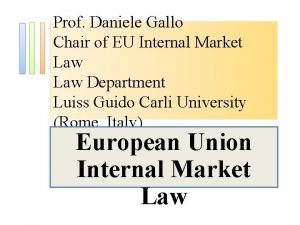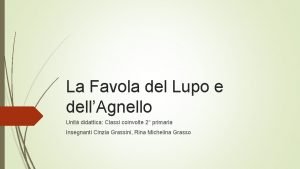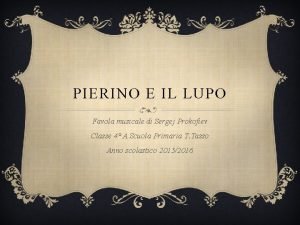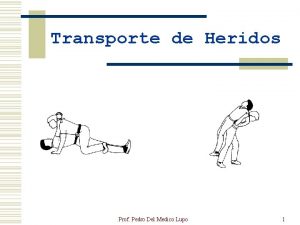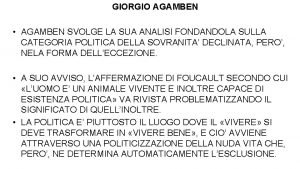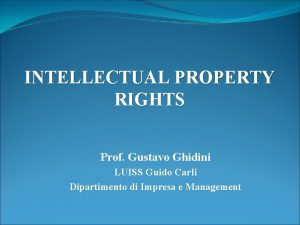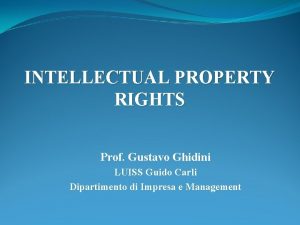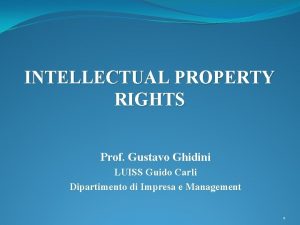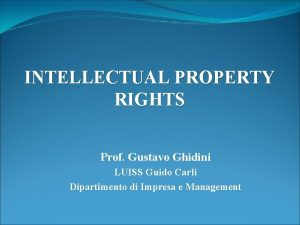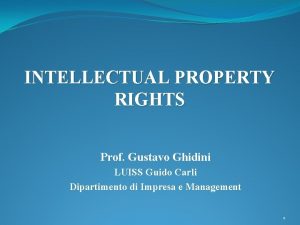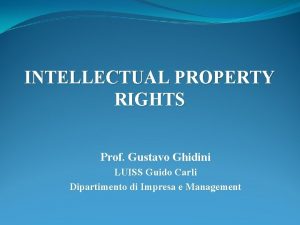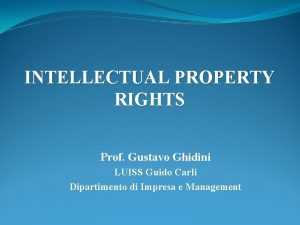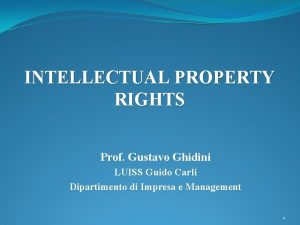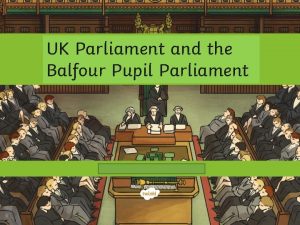Parliament and Government Prof Nicola Lupo Luiss Guido













- Slides: 13

Parliament and Government Prof. Nicola Lupo Luiss Guido Carli Department of Political Science Public Law Rome, April 2013 1

The Italian Parliament • A “perfect” bicameral system: Chamber of Deputies and Senate: symmetrical, regarding their popular election (except for life senators) and powers. • Both Chambers exercise, on equal footing, the legislative function: any bill can start indifferently in any of the two Chambers and needs to be approved in the same text by both Chambers in order to become a law (so called “navette”- “shuttle”). • The Government needs to have the confidence of both Chambers. 2

The structure of the Italian Parliament • Speakers • Parliamentary groups • Parliamentary committees: standing and special • Parliamentary delegations • Conference of Group Chairpersons • Bureau • Committee on the Rules of Procedure Rules of procedure adopted, with absolute majority: art. 64 Const. ) by each Chamber in 1971 and often revised (but not in the last 13 years, except for minor sections). 3

One Parliament or two Chambers? • Chamber and Senate in joint session: only for specific functions (mainly elective) • Bicameral Committees (of inquiry, on regional affairs, on RAI-TV, and so on) • In search of a rationale for the bicameral system, nowadays 4

The law-making process • Legislative initiative (by the Government, individual MPs, 50, 000 citizens, the National Council for Economy and Labour-CNEL and the Regional Councils) • Approval by the House, before which it is presented first • Transmission of the bill to the other House and its approval in the same text or with amendments (in the latter case, going back to the first House) • Promulgation by the President of the Republic, publication in the Official Journal and entering into force. 5

Committees in law-making process Ordinary procedure: the bill is first entrusted to the Parliamentary Committee, having the task of making a preliminary consideration and assessment and of preparing a text to be discussed on the Floor of the House (Committee acting in a reporting capacity) Special procedures: Committees acting in a legislative capacity (having the task of considering and definitively approving a bill) or in a drafting capacity (the House, may vote only on the articles, but may not amend them). The bill, however, is resubmitted to the Floor of the House if a demand to this effect is made by: a) the Government; b) one tenth of the Deputies; c) one fifth of the members 6 of the Committee (art. 72. 3 Const).

Legislative Decrees (Art. 76 Const. ) (Parliament) Delegation Law (Government) Legislative Decree The exercise of the legislative function may not be delegated to the Government unless principles and criteria have been established and then only for a limited time and for specified objects. 7

Law Decrees (or Decree-Laws) (Art. 77 Const. ) (Government) Law Decree (Parliament) Conversion Law The Government may not, without an enabling act from the Houses, issue decrees having the force of ordinary law. When in extraordinary cases of necessity and urgency the Government adopts provisional measures having the force of law, it must on the same day present said measures for confirmation to the Houses which, even if dissolved, shall be summoned especially for this purpose and shall convene within five days. The decrees lose effect from their inception if they are not confirmed within sixty days from their publication. The Houses may however regulate by law legal relationships arising out of not confirmed decrees. 8

The relationship Parliament-Government: the vote of confidence and the motion of no confidence Parliamentary Form of Government: • vote of confidence at the beginning by both Chambers • The Government has to resign after the approval of a motion of no confidence by one Chamber Art. 94: The Government must have the confidence of both Houses. Each House grants or withdraws its confidence through a reasoned motion and which is voted on by roll-call. Within ten days of its formation the Government shall come before the Houses to obtain their confidence. 9

The formation of the Government Art. 92 The Government of the Republic is made up of the President of the Council and the Ministers, who together form the Council of Ministers. The President of the Republic appoints the President of the Council of Ministers and, on his proposal, the Ministers. Art. 93 Before taking office, the President of the Council of Ministers and the Ministers shall be sworn in by 10 the President of the Republic.

The structure of the Government Art. 95 The President of the Council conducts and holds responsibility for the general policy of the Government. The President of the Council ensures the coherence of political and administrative policies, by promoting and coordinating the activity of the Ministers. The Ministers are collectively responsible for the acts of the Council of Ministers; they are individually responsible for the acts of their own ministries. The law establishes the organisation of the Presidency of the Council, as well as the number, competence and organisation of the ministries. 11

The influence of the European Union on the form of Government The Executive becomes stronger (Council) The Premier becomes stronger (European Council) Limits on Legislative Function of the Parliament Art. 117 (after Constitutional Law n. 3/2001) Legislative powers shall be vested in the State and the Regions in compliance with the Constitution and with the constraints deriving from EU-legislation and international obligations. More need of parliamentary powers also during the elections and the crises. 12

Presidentialisation of the Italian Form of Government • The presidentialisation of politics has been observed as a common phenomenon in contemporary democracies, due to causes such as the internationalisation of politics, the changing structure of mass communication and the erosion of traditional social cleavage politics • In Italy, the adoption of majority electoral systems has been a strong contribution to the presidentialisation of the Government. • Especially the electoral law approved in 2005, which provides that each list or coalition must sign its official program and indicate its support for the coalition's leader: who, if the coalition wins, becomes the natural candidate to the prime-ministership, although the law states that the powers of the President of the Republic are not infringed by this provision. 13
 Daniele gallo luiss
Daniele gallo luiss Myos luiss
Myos luiss Advantages of media influence on parliament
Advantages of media influence on parliament What are the three levels of government
What are the three levels of government Sequenze storia pierino e il lupo
Sequenze storia pierino e il lupo Il lupo e l'agnello divisione in sequenze
Il lupo e l'agnello divisione in sequenze Disegni fiabe in sequenza
Disegni fiabe in sequenza Pierino e il lupo classe quarta
Pierino e il lupo classe quarta Pierino e il lupo musica scuola primaria
Pierino e il lupo musica scuola primaria Mochila lupo
Mochila lupo Lupo pecora cavolfiore
Lupo pecora cavolfiore Lupo mannaro umano
Lupo mannaro umano Sarah lupo
Sarah lupo Il lupo e l agnello bullismo
Il lupo e l agnello bullismo
